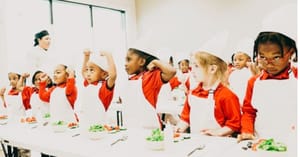Beverages: Iced up drinksBeverages: Iced up drinks
Frozen beverages offer big results for a small investment. It’s summertime—the perfect opportunity to introduce frozen beverages.
July 1, 2014
It’s summertime—the perfect opportunity to introduce frozen beverages. Take a page from Barbara Flowers, director of dining services at Ingleside Homes, in Wilmington, Del., who installs a self-serve slushy machine every summer, rotating flavors such as mango, black cherry, lemon and alcoholic margaritas. “Our residents love it. It keeps them cool during the hot summer days,” she says.
Younger crowds are equally interested in frozen drinks. Brandon Durio, executive chef for Denver’s Cherry Creek Schools, offers individual frozen drink squeeze packs. “Frozen snacks have always been kids’ favorite, and we notice sales going up the warmer the weather gets,” Durio says.
But frozen drinks aren’t just for warm weather. Stephanie Santoya, a barista at Washington College, in Chestertown, Md., offers a variety of frozen drinks year-round, such as Peachy Chai, Mocha and Berry Bonanza, most of which are made with frozen yogurt. Though smoothie sales are highest during warm weather, Santoya creates seasonal drinks like Pumpkin Pie Smoothies to boost sales during colder months.
Dean Messina, assistant director of dining services at SUNY Fredonia, in New York, can relate. “Although we battle the cold weather for a good part of the school year, we still have brisk sales of smoothies and milkshakes, as some students consider them a dessert option.”
It’s all about getting creative, Santoya says. “Our Orangesicle smoothie came out of the need to use a surplus of orange juice and became a way to turn our extra product into a delicious and sellable beverage. Similarly, we creatively apply the coffee products we already have to create specialty frozen beverages without needing to bring in extra product.”
Boosting sales
“Frozen drinks are a high-demand product that boost customer loyalty and sales at a low food cost,” Santoya adds. “The only necessary investment is a blender, but the payoff is huge.”
Operators have found success with a variety of concentrated products. Flowers uses syrups that come in sugar-free varieties, while Durio recommends using a full-service company that, in addition to making deliveries, also provides maintenance for the machines.
Messina offers made-to-order smoothies and milkshakes made with a fat-free, cholesterol-free, gluten-free frozen yogurt.
Though Syed Hasan, manager of Baja Grill at the University of Missouri, in Columbia, added smoothies in an attempt to diversify the menu, the drinks turned out to be very profitable, he says, selling nearly 400 each day. Hasan’s profit margin for these beverages ranges between 72 cents and $1.58, with strawberry being the most expensive to create. “The success of these beverages comes from the simplicity of assembly, which also makes training easier and quality and consistency better, and the quality of ingredients, which are all real, not premade. Our customers love the flavor and are willing to pay for it.”
About the Author
You May Also Like




.jpg?width=300&auto=webp&quality=80&disable=upscale)